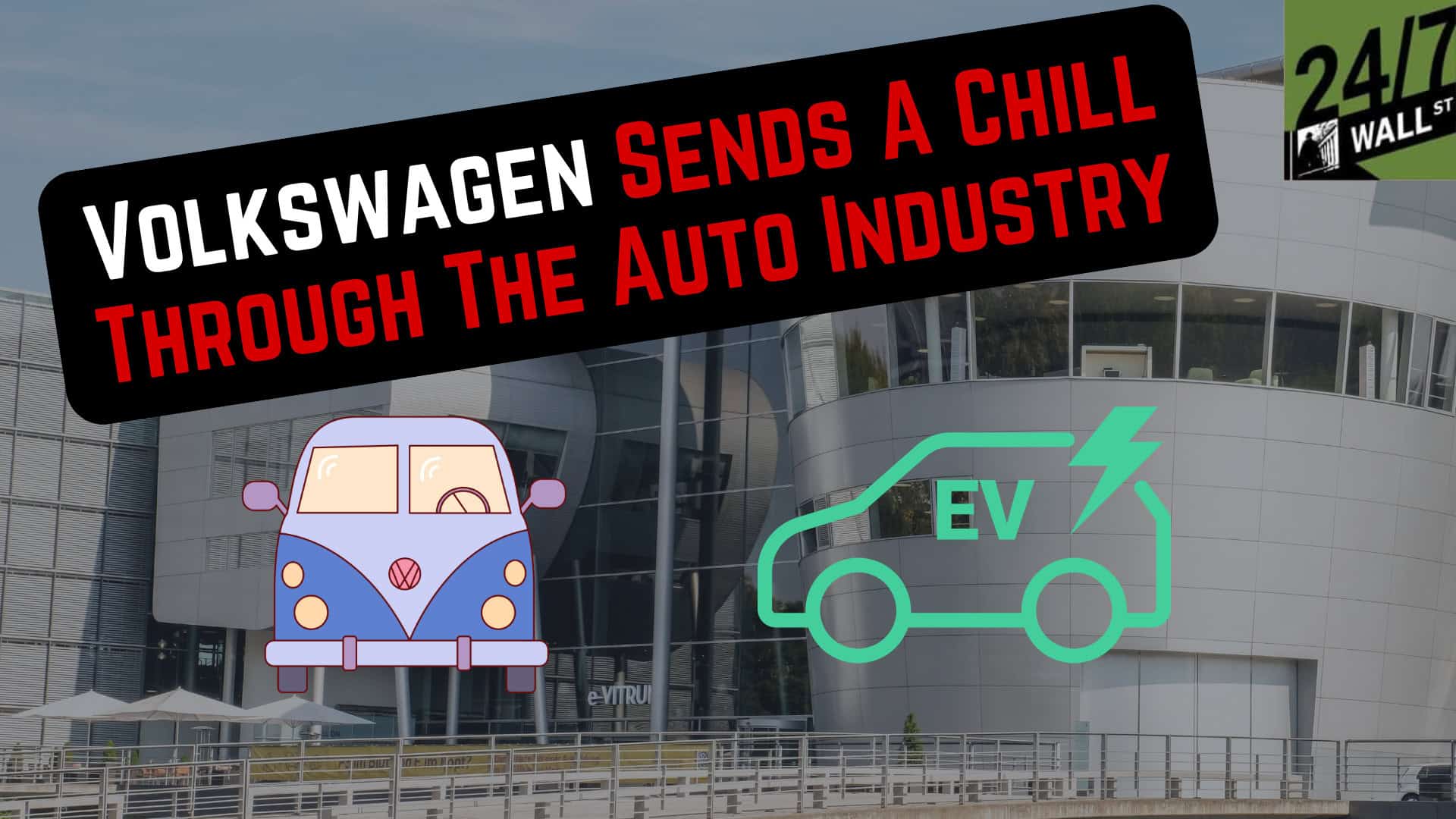
Key Points:
- Volkswagen’s First Plant Closures in Germany: A historic move causing significant concern.
- EV Sales Struggles: Low demand in Europe, conflicting with EU regulations to reduce gas-powered cars.
- Union Conflict: Labor unions feel betrayed by the closures.
- Though EV companies have some struggles and challenges, investors have already identified “The Next Nvidia.” See what all the excitement is about by clicking here now.
Lee and Doug discussed Volkswagen’s unprecedented plans to close manufacturing facilities in Germany, which has caused significant concern in the country. They emphasized the unique structure of German labor relations, where workers have representation on the supervisory boards, akin to having union seats on U.S. corporate boards. The discussion then shifted to the challenges Volkswagen faces with electric vehicle (EV) sales in Europe, particularly in Germany, and the regulatory pressure from the EU to reduce gas-powered car production. They also touched on the contrast between EV adoption in smaller countries like Norway and the challenges larger countries may face in making EVs the standard.
Watch the Video
Edited Video Transcript:
[00:00:00] Douglas A. McIntyre: So Volkswagen, uh, a German company, second largest manufacturer in the world after Toyota, they are, uh, plans to close, uh, manufacturing facilities in its home country, which is Germany. As far as I know, that has never happened. As far as I know, that’s, that’s, it’s, it’s never happened before. So the
[00:00:21] Lee Jackson: 87 year history of the very illustrious illustrious company.
[00:00:27] Lee Jackson: Yeah. They’ve never had that happen. And it’s really, really shaken the tree in Germany.
[00:00:33] Douglas A. McIntyre: Well, the other thing that people in the United States need to understand is, is that the, the unions, the workers. Have representatives on the supervisory boards, which are our board of directors. So it’s as if the UAW had seats at General Motors and Ford, this ends up being a very bitter, uh, break between labor.
[00:00:56] Douglas A. McIntyre: They’re in Volkswagen because they’re saying, you know, our understanding with you is you’ll never close a plant in Germany. Now, of course, that’s not the understanding, but based on tradition, that’s their understanding. Yeah. I want to tell you the confusion here. Evie sales in Europe are crummy and in Germany, they’re awful.
[00:01:21] Douglas A. McIntyre: Volkswagen has put a lot of money into EVs, like the rest of these guys. And the EU has said, you need to reduce the number of gas powered cars that you produce and move towards EVs. Notice that’s a rule. That’s not a suggestion from the EU. What’s happened is, is that they’re stuck right now between having to manufacture gas powered cars, because that’s what the customers want.
[00:01:47] Douglas A. McIntyre: And
[00:01:48] Lee Jackson: that’s what’s selling.
[00:01:50] Douglas A. McIntyre: And the demands of the government that they have to ramp down production of gas powered cars. So a manufacturer like Volkswagen, it’s problem isn’t just customer demand. It’s, it’s the regulations that tell them they need to start to get out of the gas powered car business.
[00:02:09] Lee Jackson: Yeah. And you know, they’re getting to the point now where they’re, if these plants are indeed shut down and there’s two of them, um, it will be a seismic shift. In probably the German and perhaps the European opinion as well is how much the EV market is is going to be part of the landscape over the next 50 years.
[00:02:32] Lee Jackson: It’s funny, I saw a clip that said in Norway, the majority of the cars on the road are EVs. I checked out Norway’s population, it’s like five million. And then I’m thinking, okay, And then how many total cars is there? So I guess it’s possible in a small country like that, but in larger countries with bigger populations, it’ll never be the standard.
[00:02:54] Douglas A. McIntyre: Well, look as an, as an aside, what they didn’t tell you in that story is, is that they were comparing EVs and gas powered cars, the majority of the vehicles in Norway are diesel. exactly.
The Average American Has No Idea How Much Money You Can Make Today (Sponsor)
The last few years made people forget how much banks and CD’s can pay. Meanwhile, interest rates have spiked and many can afford to pay you much more, but most are keeping yields low and hoping you won’t notice.
But there is good news. To win qualified customers, some accounts are paying almost 10x the national average! That’s an incredible way to keep your money safe and earn more at the same time. Our top pick for high yield savings accounts includes other benefits as well. You can earn up to 3.80% with a Checking & Savings Account today Sign up and get up to $300 with direct deposit. No account fees. FDIC Insured.
Click here to see how much more you could be earning on your savings today. It takes just a few minutes to open an account to make your money work for you.
Our top pick for high yield savings accounts includes other benefits as well. You can earn up to 4.00% with a Checking & Savings Account from Sofi. Sign up and get up to $300 with direct deposit. No account fees. FDIC Insured.
Thank you for reading! Have some feedback for us?
Contact the 24/7 Wall St. editorial team.





